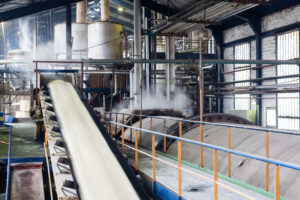Vacuum pumps are used in the food industry for various applications such as packaging, processing, and pneumatic conveying. They are used to create vacuum environments to preserve food quality and extend shelf-life by reducing oxygen levels, removing moisture, and reducing the growth of organic microorganisms.

In food processes, where the food product and surrounding environment can be highly corrosive, abrasive, or prone to contamination, vacuum pumps designed for long-term operation can be crucial. Vacuum pumps are made of materials resistant to corrosion, abrasion, and contamination. Additionally, they often have specialized features such as:
- Sanitary design: Vacuum pumps for food processing are designed to be corrosion-resistant, easily cleaned, and sanitized.
- Oil-free operation: Liquid ring vacuum pumps can run with water or synthetic compressor oil, which does not contaminate the food.
- High reliability: Vacuum pumps are designed for food processes built to last and operate over extended periods, even in corrosive environments.
- Energy efficiency: Vacuum pumps are manufactured with stainless steel wetted parts and are designed for low corrosion and long-term operation in food processes to not waste power over the life of the pumps.
Vacuum pumps are built for long-term operation in food processes. They are often made of materials resistant to corrosion, abrasion, and contamination, have a sanitary design, can operate without oil, are highly reliable, and conserve operating power. These features help ensure that the vacuum pump performs effectively and consistently in the food processing environment while maintaining food quality and safety.
